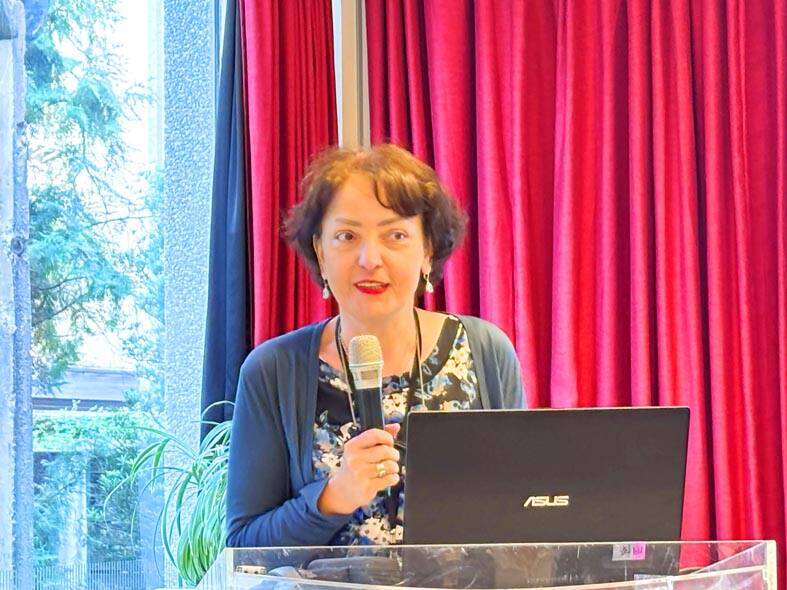Funding appropriated for defense projects should be sufficient to strengthen the “resilience shield” before essential assistance arrives, a former Georgian defense minister said at a forum in Taipei yesterday.
Former Georgian minister of defense Tinatin Khidasheli, who heads a think tank fighting the Soviet legacy in Georgia, is a research fellow at the Taiwan Democracy Foundation.
She was asked to comment on the defense budget proposal that President William Lai (賴清德) announced yesterday, in which NT$1.25 trillion (US$39.9 billion) would be spent in the next eight years to hone the nation’s capabilities in fighting asymmetric warfare.

Photo: CNA
“Let me be very straightforward: No amount of money that Taiwan, Georgia, or Estonia can allocate for defense will ever be sufficient — on its own — to counter hybrid warfare when facing a much larger and wealthier neighbor with far greater manpower,” Khidasheli said. “Even if we all die as heroes, Russia would still outnumber us. That is not the issue to think about when you put together a defense budget.”
“The defense budget for countries like us [Taiwan and Georgia] should be sufficient to shore up the ‘resilience shield’ that I was talking about. We need to be ready to be this first shield that is unbreakable before essential help comes, and I believe that should be our target, and whatever fits that scenario is a good answer,” she said.
Khidasheli said that the world is now facing a global arms race, which started with nations not learning from the war in Georgia in 2008 that Russia can act like a bully, and not taking into consideration the warning Georgia sent about Ukraine.
“The lesson was not learned even after Russia took over Crimea in 2014,” she said.
Khidasheli said that she does not have a magic number for Taiwan in terms of defense spending, but there are standards to consider when setting a budget, such as 2 to 5 percent of the GDP in NATO nations.
“We need to fight bullies with soft power, but we need to be smart about it,” she said.
Asked about the lessons that Taiwan can learn from Georgia and the leverage Taiwan can use to counter the threat from China, Khidasheli said that democracy is the biggest source of leverage, adding that maintaining democracy is the way to stand with nations on whom you rely on in case something happens.
“The Georgian reform is often called the miracle of the post-Soviet world, because we managed to defeat corruption that everybody thought was endemic and unavoidable,” she said. “What the West saw in us is that if Georgia can be successful, that would be a great message for Russia and Belarus.”
Aside from being a democratic nation, Taiwan holds greater leverage: microchips, which function as a powerful instrument that makes the nation important, she said, adding that the leverage makes others care about Taiwan.

The manufacture of the remaining 28 M1A2T Abrams tanks Taiwan purchased from the US has recently been completed, and they are expected to be delivered within the next one to two months, a source said yesterday. The Ministry of National Defense is arranging cargo ships to transport the tanks to Taiwan as soon as possible, said the source, who is familiar with the matter. The estimated arrival time ranges from late this month to early next month, the source said. The 28 Abrams tanks make up the third and final batch of a total of 108 tanks, valued at about NT$40.5 billion

Two Taiwanese prosecutors were questioned by Chinese security personnel at their hotel during a trip to China’s Henan Province this month, the Mainland Affairs Council (MAC) said yesterday. The officers had personal information on the prosecutors, including “when they were assigned to their posts, their work locations and job titles,” MAC Deputy Minister and spokesman Liang Wen-chieh (梁文傑) said. On top of asking about their agencies and positions, the officers also questioned the prosecutors about the Cross-Strait Joint Crime-Fighting and Judicial Mutual Assistance Agreement, a pact that serves as the framework for Taiwan-China cooperation on combating crime and providing judicial assistance, Liang

A group from the Taiwanese Designers in Australia association yesterday represented Taiwan at the Midsumma Pride March in Melbourne. The march, held in the St. Kilda suburb, is the city’s largest LGBTQIA+ parade and the flagship event of the annual Midsumma Festival. It attracted more than 45,000 spectators who supported the 400 groups and 10,000 marchers that participated this year, the association said. Taiwanese Designers said they organized a team to march for Taiwan this year, joining politicians, government agencies, professionals and community organizations in showing support for LGBTQIA+ people and diverse communities. As the first country in Asia to legalize same-sex

MOTIVES QUESTIONED The PLA considers Xi’s policies toward Taiwan to be driven by personal considerations rather than military assessment, the Epoch Times reports Chinese President Xi Jinping’s (習近平) latest purge of the Chinese People’s Liberation Army (PLA) leadership might have been prompted by the military’s opposition to plans of invading Taiwan, the Epoch Times said. The Chinese military opposes waging war against Taiwan by a large consensus, putting it at odds with Xi’s vision, the Falun Gong-affiliated daily said in a report on Thursday, citing anonymous sources with insight into the PLA’s inner workings. The opposition is not the opinion of a few generals, but a widely shared view among the PLA cadre, the Epoch Times cited them as saying. “Chinese forces know full well that